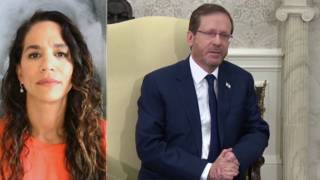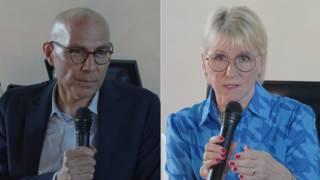
Listen to the Talking China In Eurasia podcast
Apple Podcasts | Spotify | Google | YouTube
Welcome back to the China In Eurasia Briefing, an RFE/RL newsletter tracking China’s resurgent influence from Eastern Europe to Central Asia.
I’m RFE/RL correspondent Reid Standish and here’s what I’m following right now.
As Huthi rebels continue their assault on commercial shipping in the Red Sea, the deepening crisis is posing a fresh test for China’s ambitions of becoming a power broker in the Middle East – and raising questions about whether Beijing can help bring the group to bay.
Finding Perspective: U.S. officials have been asking China to urge Tehran to rein in Iran-backed Huthis, but according to the Financial Times, American officials say that they have seen no signs of help.
Still, Washington keeps raising the issue. In weekend meetings with Chinese Foreign Minister Wang Yi in Bangkok, U.S. national-security adviser Jake Sullivan again asked Beijing to use its “substantial leverage with Iran” to play a “constructive role” in stopping the attacks.
Reuters, citing Iranian officials, reported on January 26 that Beijing urged Tehran at recent meetings to pressure the Huthis or risk jeopardizing business cooperation with China in the future.
There are plenty of reasons to believe that China would want to bring the attacks to an end. The Huthis have disrupted global shipping, stoking fears of global inflation and even more instability in the Middle East.
This also hurts China’s bottom line. The attacks are raising transport costs and jeopardizing the tens of billions of dollars that China has invested in nearby Egyptian ports.
Why It Matters: The current crisis raises some complex questions for China’s ambitions in the Middle East.
If China decides to pressure Iran, it’s unknown how much influence Tehran actually has over Yemen’s Huthis. Iran backs the group and supplies them with weapons, but it’s unclear if they can actually control and rein them in, as U.S. officials are calling for.
But the bigger question might be whether this calculation looks the same from Beijing.
China might be reluctant to get too involved and squander its political capital with Iran on trying to get the Huthis to stop their attacks, especially after the group has announced that it won’t attack Chinese ships transiting the Red Sea.
Beijing is also unlikely to want to bring an end to something that’s hurting America’s interests arguably more than its own at the moment.
U.S. officials say they’ll continue to talk with China about helping restore trade in the Red Sea, but Beijing might decide that it has more to gain by simply stepping back.
Three More Stories From Eurasia
1. ‘New Historical Heights’ For China And Uzbekistan
Uzbek President Shavkat Mirziyoev made a landmark three-day visit to Beijing, where he met with Xi, engaged with Chinese business leaders, and left with an officially upgraded relationship as the Central Asian leader increasingly looks to China for his economic future.
The Details: As I reported here, Mirziyoev left Uzbekistan looking to usher in a new era and returned with upgraded diplomatic ties as an “all-weather” partner with China.
The move to elevate to an “all-weather comprehensive strategic partnership” from a “comprehensive strategic partnership” doesn’t come with any formal benefits, but it’s a clear sign from Mirziyoev and Xi on where they want to take the relationship between their two countries.
Before going to China for the January 23-25 trip, Mirziyoev signed a letter praising China’s progress in fighting poverty and saying he wanted to develop a “new long-term agenda” with Beijing that will last for “decades.”
Beyond the diplomatic upgrade, China said it was ready to expand cooperation with Uzbekistan across the new energy vehicle industry chain, as well as in major projects such as photovoltaics, wind power, and hydropower.
Xi and Mirzoyoev also spoke about the long-discussed China-Kyrgyzstan-Uzbekistan railway, with the Chinese leader saying that work should begin as soon as possible, athough no specifics were offered and there are reportedly still key disputes over how the megaproject will be financed.
2. The Taliban’s New Man In Beijing
In a move that could lay the groundwork for more diplomatic engagement with China, Xi received diplomatic credentials from the Taliban’s new ambassador in Beijing on January 25.
What You Need To Know: Mawlawi Asadullah Bilal Karimi was accepted as part of a ceremony that also received the credential letters of 42 new envoys. Karimi was named as the new ambassador to Beijing on November 24 but has now formally been received by Xi, which is another installment in the slow boil toward recognition that’s under way.
No country formally recognizes the Taliban administration in Afghanistan, but China – along with other countries such as Pakistan, Russia, and Turkmenistan – have appointed their own envoys to Kabul and have maintained steady diplomatic engagement with the group since it returned to power in August 2021.
Formal diplomatic recognition for the Taliban still looks to be far off, but this move highlights China’s strategy of de-facto recognition that could see other countries following its lead, paving the way for formal ties down the line.
3. China’s Tightrope With Iran and Pakistan
Air strikes and diplomatic sparring between Iran and Pakistan raised difficult questions for China and its influence in the region, as I reported here.
Both Islamabad and Tehran have since moved to mend fences, with their foreign ministers holding talks on January 29. But the incident put the spotlight on what China would do if two of its closest partners entered into conflict against one another.
What It Means: The tit-for-tat strikes hit militant groups operating in each other’s territory. After a tough exchange, both countries quickly cooled their rhetoric – culminating in the recent talks held in Islamabad.
And while Beijing has lots to lose in the event of a wider conflict between two of its allies, it appeared to remain quiet, with only a formal offer to mediate if needed.
Abdul Basit, an associate research fellow at Singapore’s S. Rajaratnam School of International Studies, told me this approach reflects how China “shies away from situations like this,” in part to protect its reputation in case it intervenes and then fails.
Michael Kugelman, the director of the Wilson Center’s South Asia Institute, added that, despite Beijing’s cautious approach, China has shown a willingness to mediate when opportunity strikes, pointing to the deal it helped broker between Iran and Saudi Arabia in March.
“It looks like the Pakistanis and the Iranians had enough in their relationship to ease tensions themselves,” he told me. “So [Beijing] might be relieved now, but that doesn’t mean they won’t step up if needed.”
Across The Supercontinent
China’s Odd Moment: What do the fall of the Soviet Union and China’s slowing economy have in common? The answer is more than you might think.
Listen to the latest episode of the Talking China In Eurasia podcast, where we explore how China’s complicated relationship with the Soviet Union is shaping the country today.
Invite Sent. Now What? Ukraine has invited Xi to participate in a planned “peace summit” of world leaders in Switzerland, Reuters reported, in a gathering tied to the second anniversary of Russia’s invasion.
Blocked, But Why? China has suspended issuing visas to Lithuanian citizens. Foreign Minister Gabrielius Landsbergis confirmed the news and told Lithuanian journalists that “we have been informed about this. No further information has been provided.”
More Hydro Plans: Kyrgyzstan’s Ministry of Energy and the China National Electric Engineering Company signed a memorandum of cooperation on January 24 to build a cascade of power plants and a new thermal power plant.
One Thing To Watch
There’s no official word, but it’s looking like veteran diplomat Liu Jianchao is the leading contender to become China’s next foreign minister.
Wang Yi was reassigned to his old post after Qin Gang was abruptly removed as foreign minister last summer, and Wang is currently holding roles as both foreign minister and the more senior position of director of the Chinese Communist Party Central Committee Foreign Affairs Commission Office.
Liu has limited experience engaging with the West but served stints at the Communist Party’s anti-corruption watchdog and currently heads a party agency traditionally tasked with building ties with other communist states.
It also looks like he’s being groomed for the role. He recently completed a U.S. tour, where he met with top officials and business leaders, and has also made visits to the Middle East.
That’s all from me for now. Don’t forget to send me any questions, comments, or tips that you might have.
Until next time,
Reid Standish
If you enjoyed this briefing and don’t want to miss the next edition, subscribe here. It will be sent to your inbox every other Wednesday.
This content originally appeared on News – Radio Free Europe / Radio Liberty and was authored by News – Radio Free Europe / Radio Liberty.
This post was originally published on Radio Free.






